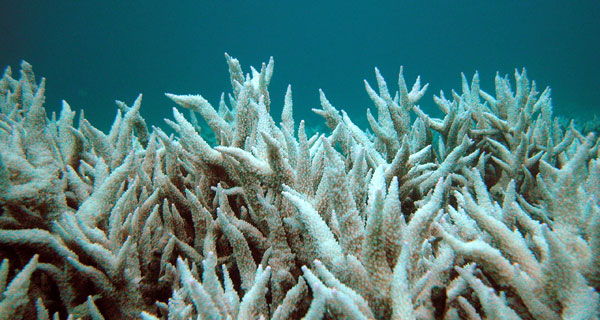UPDATE 6/23/11 Outcome of IPCC meeting on Geoengineering:
The IPCC just wrapped up a high level "expert meeting" in Peru to explore "the scientific foundations for an assessment of geoengineering." In a press conference after the controversial meeting (which included representatives from the nascent geoengineering industry) the IPCC co-chairs made it clear they would not be making any recommendations to governments regarding research funding for the controversial technologies, governance models or the legality of experimentation.
Last week, 160 organizations from around the world sent an open letter to IPCC Chairman Rajendra Pachauri expressing concerns about this IPCC meeting. Sivlia Ribeiro of watchdog ETC Group stated: "The IPCC has assured us it will go forward carefully in this work, and will not overstep its mandate by making governance recommendations. We will be closely following the process. Geoengineering is too dangerous to too many people and to the planet to be left in the hands of small group of so-called experts. Geoengineering should be an issue at the Rio+20 conference in June 2012."
A "deadly trio" of carbon-related ocean impacts (ocean acidification, warming, and oxygen depletion) may lead to global marine extinctions on a scale unprecedented in human history. This is one of the main conclusions of a new report by an international panel of marine scientists (see my previous post Ocean of Trouble for more details).
The panel's main findings were summarized as follows:
- The combination of stressors on the ocean is creating the conditions associated with every previous major extinction of species in Earth's history.
Further:
- The speed and rate of degeneration in the ocean is far faster than anyone has predicted.
- Many of the negative impacts previously identified are greater than the worst predictions.
- Although difficult to assess because of the unprecedented speed of change, the first steps to globally significant extinction may have begun with a rise in the extinction threat to marine species such as reef-forming corals.
According to one of the scientists, Professor Jelle Bijma of the Alfred Wegener Institute for Polar and Marine Research, "the current carbon perturbation is unprecedented in the Earth's history because of the high rate and speed of change. Acidification is occurring faster than in the past 55 million years..." He also pointed out that, "Most, if not all, of the five global mass extinctions in Earth's history carry the fingerprints of the main symptoms of global carbon perturbations."
In this case, however, it is us doing the perturbing. Humans are currently conducting what amounts to a radical geo-engineering of the Earth's life-support system. Geo-engineering is defined as "the deliberate large-scale manipulation of the planetary environment." Knowing what we do about the relationship between our excessive fossil fuel-driven CO2 emissions and climate change, we can no longer pretend that our impact on the planetary environment is accidental.
So it is with some irony that the release of this report coincides with a two-day meeting of IPCC experts to discuss geo-engineering as part of a "portfolio of response options to anthropogenic climate change."
Generally speaking, geo-engineering schemes fall into two categories: those which aim to lower temperature (think sunblock, but on a planetary scale), and those which aim to get CO2 out of the atmosphere (such as the 'fertilization' of the ocean with iron to increase CO2-absorbing plankton).
 International Programme on the State of the Ocean (IPSO)
International Programme on the State of the Ocean (IPSO)
Whenever I hear of these sorts of schemes, I think of a Dr. Seuss book I used to read as a child -- The Cat in the Hat Comes Back. The self-indulgent cat gorges himself on pink cake in the bath, leaving behind a rosy ring in the tub. Every effort by his team of helper cats to clean up the mess simply causes the stain to spread further, until eventually the entire house and snowy yard has turned into a sickening sea of pink. Just in the nick of time, before the parents come home and the kids get busted, the tiniest cat pulls a out a magical "Voom" from his hat which miraculously cleans up the mess.
If only we had a Voom to clean up the twin problems of climate change and ocean meltdown, and we could put all those fossil fuels back in the hat. But since we don't and we can't, we must face three inevitable conclusions:
- We need to end our 200-year-old addiction to fossil fuels, a habit which is dumping enormous quantities of CO2 into the atmosphere. In 2010 we set a record -- emitting 30.6 gigatonnes of CO2. By conserving energy, using efficiency technologies, and fully replacing fossil fuels with clean renewable sources we can kick the habit. There are many scenarios that prove this is not some utopian vision, but a feasible undertaking that could be accomplished in the next few decades. It's a no-brainer -- the transformation is already underway, and lots of jobs are being created as a result. But governments must stop dragging their feet on measures which could rapidly accelerate this new energy revolution.
As for me, I can't decide what's scarier: men in lab coats playing out their sci-fi fantasies (at least that's how I picture them), or the fact that there are top scientists who believe we may reach a point when such schemes will actually be needed to save human civilization.
What do you think...? Should we continue our indulgent fossil fuel habit assuming that scientists will actually find the "Vroom" before it's too late? Or do we just say 'No' to fossil fuels?

